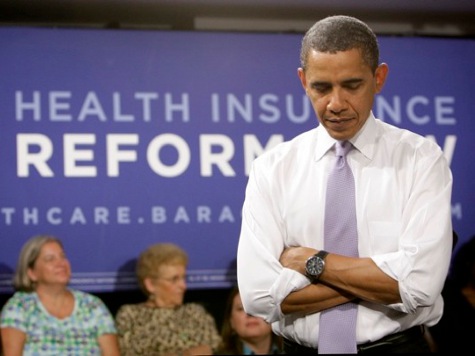
The refusal by a majority of states to set up state-based exchanges could neuter some important aspects of Obamacare and make it more difficult for the federal government to actually implement the law.
On December 12th, Pennsylvania Gov. Tom Corbett, a Republican, announced his state would not participate in Obamacare’s state-based health insurance exchange program, making Pennsylvania the 28th state to allow the federal government to operate its health insurance exchange.
Healthcare analysts have estimated it would cost each state $10 million to $100 million per year to run a health insurance exchange. The Obama administration cannot afford to absorb these costs, hoping instead to pass the burden down to the states.
But the White House has created even more uncertainty by not providing sufficient guidelines for the states, and that is why many, like Pennsylvania, are choosing not to sign up for a system that lacks firm guidelines; doing so would make states vulnerable to being blamed when, inevitably, taxes and health care costs go up while the quality of healthcare deteriorates.
Corbett said he has “decided not to pursue a state-based health insurance exchange at this time” because it “would be irresponsible to put Pennsylvanians on the hook for an unknown amount of money to operate a system under rules that have not been fully written.”
He said his administration has “asked HHS questions to help determine costs, impacts and flexibility in order to inform our decisions” and were not provided with sufficient or clear answers.
Corbett said “healthcare reform is too important to be achieved through haphazard planning” and Pennsylvanians and businesses “deserve informed decision making and a strong plan that responsibly uses taxpayer dollars.”
Writing in the Wall Street Journal, James Capretta and Yuval Levin wrote that the “idea that creating state exchanges would give states control over their insurance markets is a fantasy” because states would simply be “enforcing a federal law and federal regulations, with very little room for independent judgment.”
“By declining to build exchanges, the states would pass the burden and costs of the exchanges to the administration that sought this law,” they wrote. “And it is far from clear that the administration could operate the exchanges on its own.”
Levin and Capretta also questioned if the Obama administration had statutory authority to actually allocate money to run the federal exchanges for states that choose not to participate:
Congress didn’t allocate money for administering federal exchanges, and the law as written seems to prohibit federally run exchanges from providing subsidies to individuals. The administration insists that it can provide those subsidies anyway. But if the courts read the plain words of the statute, then federal exchanges couldn’t really function.
They determined that if enough states “refuse to create their own exchanges,” they could, in effect, “be repealing a large part of the law,” especially since doing so would exempt businesses from Obamacare’s employer mandate.
The Cato Institute’s Michael Cannon wrote “defaulting to a federal exchange exempts a state’s employers from the employer mandate — a tax of $2,000 per worker per year (the tax applies to companies with more than 50 employees, but for such companies that tax applies after the 30th employee, not the 50th).”
If every state refused to set up state-based health insurance exchange, an estimated 18 million Americans would be exempt from the “individual mandate’s tax of $2,085 per family of four,” which would also improve a “state’s prospects for job creation” while protecting the “conscience rights of employers and individuals whom the Obama administration is forcing to purchase contraceptives coverage.”
David Catron, a health policy expert, wrote “if the states refuse to set up exchanges, they cut off the subsidies and tax credits that are the lifeblood of Obamacare.” By not setting up the exchanges, Catron wrote states would also not be “enabling bureaucracies” and protect “their business communities from job-killing federal penalties — even if the federal government comes in and sets up its own exchanges in those states.”
“Without its insurance exchanges, the Obamacare scheme simply will not work, but the states are fighting in the last ditch against an increasingly powerful and lawless federal government determined to foist them on us,” Catron wrote, before acknowledging that “if the states are bullied into setting up their own exchanges or the IRS gets away with its extralegal rule to fund federal exchanges, we’re probably stuck with” Obamacare.
But that may be dependent on yet another court ruling.
If the Obama administration attempts to “distribute the subsidies and enforce the mandates” in the resisting states, those states could potentially sue the Obama administration; at minimum, this could “force Congress to reopen the health care law,” opening up another “opportunity to properly scrutinize Obamacare.”

COMMENTS
Please let us know if you're having issues with commenting.